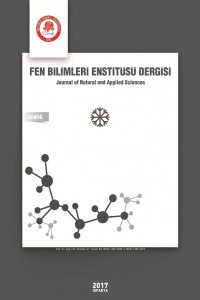Öz
In this study, a new refrigerant HFE7000, has been investigated thermodynamically in the cascade cooling system. Energy (COP) and exergy efficiency of cascade cooling system with CO2/HFE7000 refrigerants are performed. In this regard, the impacts of various parameters on the COP and exergy efficiency and exergy destruction rate of CCS are studied. Moreover, the CO2 refrigerant is used in the low-temperature circuit and HFE7000 is used in the high-temperature circuit. The COP and exergy efficiency of cascade cooling system are found as 2.313 and 0.5482, for cooling application. In the last section, comparison with R134a refrigerant is done, which is widely used in cascade cooling system.
Anahtar Kelimeler
Kaynakça
- [1] Annex 49, 2007. Energy Conservation in Buildings and Community Systems Low Exergy Systems for High Performance Buildings and Communities, homepage: http://www.annex49.com,
- [2] Chakravarthy, V.S., Shah, R.K., Venkatarathnam, G., 2011. A review of refrigeration methods in the temperature range 4-300K. Journal of Thermal Science and Engineering Applications, 3(2011), 1-18.
- [3] Yulong, S., Dongzhe, L., Dongfang, Y., Lei, Jin, Feng, C., Xiaolin W. 2017. Performance comparison between the combined R134a/CO2 heat pump and cascade R134a/CO2 heat pump for space heating, International journal of Refrigeration, 74,(2017), 592–605
- [4] Sarkar, J., Bhattacharyya, S., Gopal, M.R. 2006. Simulation of a transcritical CO2 heat pump cycle for simultaneous cooling and heating applications. Int. J. Refrigeration, 29(2006), 735–743.
- [5] Mosaffa, A.H., L. Farshi G. C.A. 2016. Infante Ferreira, M.A. Rosen, Exergoeconomic and environmental analyses of CO2/NH3 cascade refrigeration systems equipped with different types of flash tank intercoolers, Energy Conversion and Management 117 (2016) 442–453
- [6] Lee, TS., Liu, CH., Chen, TW. 2006. Thermodynamic analysis of optimal condensing temperature of cascade-condenser in CO2/NH3 cascade refrigeration systems. Int J Refrig, 29(2006), 1100–8.
- [7] Kilicarslan, A., Hosoz, M. 2010. Energy and irreversibility analysis of a cascade refrigeration system for various refrigerant couples. Energy Convers Manage, 51 (2010), 2947–54.
- [8] Yılmaz, F., Selbas, R., Ozgur, A.E., Balta, M.T. 2016. Performance Analyses of CO2-N2O Cascade System for Cooling. Energy, Transportation and Global Warming, Green Energy and Technology, Elsevier, DOI 10.1007/978-3-319-30127-3_37.
- [9] Sun, Z., Liang, Y., Liu, S., Ji, W., Zang, R., Liang, R., Guo, Z. 2016. Comparative analysis of thermodynamic performance of a cascade refrigeration system for refrigerant couples R41/R404A and R23/R404A, Applied Energy, 184 (2016), 19–25.
- [10] Parekh, A,, Tailor, P. 2011. Thermodynamic analysis of R507A–R23 cascade refrigeration system. International Journal of Aerospace Engineering , 5 (2011), 1919–23.
- [11] Lee, T., Liu, C., Chen, T. 2006. Thermodynamic analysis of optimal condensing temperature of cascade-condenser in CO2/NH3 cascade refrigeration systems. Int J Refrig, 29 (7)(2006), 1100–8.
- [12] Chen, Y., Han, W., Jin, H. 2017. Proposal and analysis of a novel heat-driven absorption compression refrigeration system at low temperatures. Appl Energy, 185(2) (2017), 2106–2116.
- [13] Getu, H., Bansal, P. 2008. Thermodynamic analysis of an R744-R717 cascade refrigeration system. Int J Refrig, 31(1) (2008), 45–54.
- [14] Dupont, 2016. ttp://www2.dupont.com/Refrigerants/en_US/uses_apps/automotive_ac/SmartAutoAC/flammabilit y_table.html#.UOxh4XdZiNc (Acc. Date: 12.10. 2016)
- [15] Electronics Materials Solution Division. 2017. http://multimedia.3m.com/mws/media/121372O/3m-novec-7000-engineered-fluid-tds.pdf (Acc. Date: 11.04. 2017)
- [16] Moran, M., 1982 “Availability Analysis: A Guide to Efficient Energy Usage”, Englewood Cliffs, NJ: Prentice-Hall,
- [17] Bejan, A., Tsatsaronis, G., Moran, M. 1996. “Thermal Design and Optimization”, New York: Wiley Inter-science.
- [18] Kotas, T. 1985. The exergy method of thermal plant analysis, Krieger Publishing Company
Ayrıntılar
| Bölüm | Makaleler |
|---|---|
| Yazarlar | |
| Yayımlanma Tarihi | 30 Ekim 2017 |
| Yayımlandığı Sayı | Yıl 2017 Cilt: 21 Sayı: 3 |
Kaynak Göster
Cited By
Options of low Global Warming Potential Refrigerant Group for a three-stage cascade refrigeration system
International Journal of Refrigeration
Zhili Sun
https://doi.org/10.1016/j.ijrefrig.2018.12.019
Karbondioksitli Kaskad Soğutma Sistemlerinin Enerji Performans Değerlendirilmesi
Mehmet Akif Ersoy Üniversitesi Uygulamalı Bilimler Dergisi
Tuğba KOVACI
https://doi.org/10.31200/makuubd.669252
Comparative thermodynamic performance analysis of a cascade refrigeration system with new refrigerants paired with CO2
Applied Thermal Engineering
Victor Adebayo
https://doi.org/10.1016/j.applthermaleng.2020.116286
e-ISSN :1308-6529
Linking ISSN (ISSN-L): 1300-7688
Dergide yayımlanan tüm makalelere ücretiz olarak erişilebilinir ve Creative Commons CC BY-NC Atıf-GayriTicari lisansı ile açık erişime sunulur. Tüm yazarlar ve diğer dergi kullanıcıları bu durumu kabul etmiş sayılırlar. CC BY-NC lisansı hakkında detaylı bilgiye erişmek için tıklayınız.


